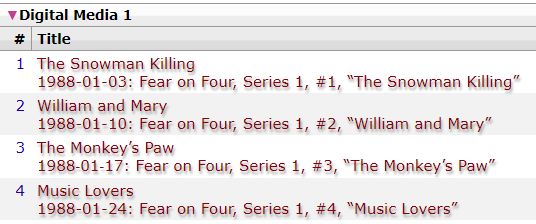I’m glad to see discussion happening on this topic. I have well-over a hundred radio dramas catalogued and tagged in my local collection that I’ve been wanting to add to MB; however, I find the current guidelines deeply unsatisfactory.
Having airdate, series title, series number, episode number, episode title in the track, release, and release group titles is helpful for disambiguation but extremely annoying for organization. On my local system, I simply map airdate to date, series title to album, series number to discnumber, episode number to tracknumber, and episode title to track title. If I don’t do this, my library would be cluttered with well over a thousand XXXX-XX-XX: Series Title, Series XX, Episode XX: “Episode Title” album entries. That’s not even considering the file naming scheme which ends of looking like this:
/XXXX-XX-XX: Series Title, Series XX, Episode XX: “Episode Title”/01 XXXX-XX-XX: Series Title, Series XX, Episode XX: “Episode Title”.ext
^^^^ I mean, Yikes. Just look at that string, I’m seeing every piece of information twice, and yet none of that information is isolated into a useful tag. The same files organized using a simplified system would be /series/seriesnumber-episodenumber title.ext
The disambiguation system is fine when you have limited information, but becomes progressively more annoying as you get more information. This is a problem. It means the more time I put into researching and entering data, the uglier and less useful the data becomes. It’s just redundant and annoying when track and album titles include broadcast dates, series numbers, and episode numbers, where series title and episode title would work just fine. The problem is there is nowhere else to put this data, so you either use it or lose it. The best I’ve seen is entire series categorized as a single release with series title as album, series number as discnumber, and episode number as tracknumber. The problem is this loses the airdate information for individual tracks. For radio dramas and podcasts, airdate for each track is important information.
I think that the central problem here is many broadcasts (radio episodes, podcast episodes, etc.) just aren’t “Releases.” They are standalone “Recordings” which are parts of a larger “Series.” This would make it a lot easier to add random broadcasts episodes and cluster them into a larger series without all the redundancy. It would also make it easier to group the recordings together as a “Release” for cataloguing physical compilations. Unfortunately, standalone recordings aren’t robust enough to enter all the information required to make this work. In the long run though, I think it would be a lot more useful than trying to cram broadcasts into a release category that just doesn’t work.
